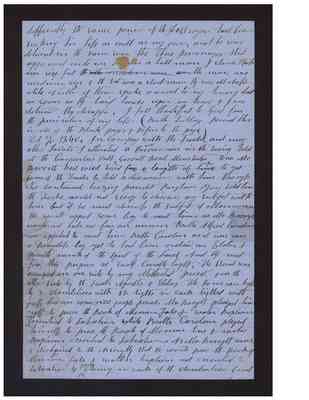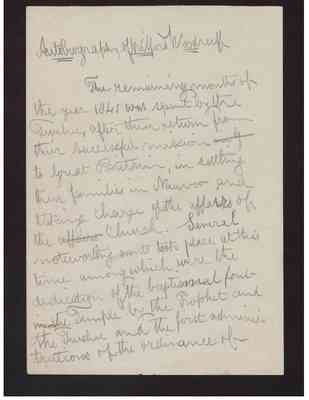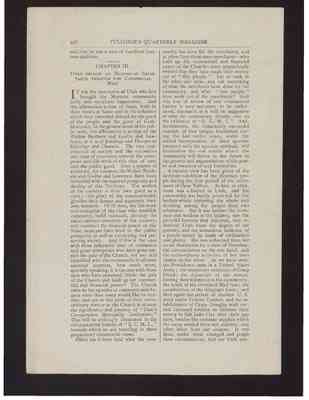Pages
page_0006
difficulty the same power of the Destroyer had been seeking his Life as well as my own, and he was delivered in the same way. The three personages that appeared unto me one was a tall man I shoude think over six feet the other middle one was anothe man was medium size & the 3rd was a short man they wee all dressed alike Neither of them spoke a word to my hearing but as soon as they laid hands upon my head & I was delivered they disappeared. I felt thankful to God for the presirvation of my life. (Brother Tullage Record this in one of the Blank pages & Refer to the page)
. In company with the Twelve and many other Saints I attended a Discussion in the Evening held at the Carpenters Hall, Garrett Road, Manchester. One Mr Barrett had tried hard for a length of time to get some of the Twelve to hold a discussion with him. th[r]ough his continued teazing president Brigham Young told him the Twelve would not stoop to discuss any subject with him but if he must discuss the subject of Mormonsm He would appont some bo[d]y to meet him as Mr Barry would not take no for an answer Brothe Alfred Corden was apponted to meet him Brother Cordon as it were was a Beardless boy yet he had been ordand an Elder & possessed much of the Spirit of the Lord And they met for this purpos at Early candle light. The Stand was occupied on one side by many Methodist priest, & on the othe side by the Twelve Apostles & Elders. The Home was light by 3 chandeliers with 12 lights in each lighted with gass there was some 1500 people present. Mr Barrett pledged himself to prove the Book of Mormon Fals & water Baptism ^not^ Essential to Salvation while Brother Cordon pleged himself to prove the Book of Mormon true & water Baptisms essential to Salvation. As Mr Barrytt arose & declgaired to the Assembly that He would prove the Book of Mormon Fals & watter baptism not essential to Salvation 4 ^glass^ chimney in each of the chanderliers burnt
page_0007
to peaces & the glass flew among the congregation And the man who had tended the gass in that Hall and for twenty years said he had never know any weirder of the kind. the chimneys were replasced & the discussions went on I set by the side of Doctor W Richards and at the commencement of the meeting A very interesting old gentleman apperd in the congregation he sat at the end of a seat going the ally near the platform. He made me think if what he s is said of the Ancient of Days his hair was white as wool & rested in a large white roll upon his shoulder, he was a noble looking man he Eyed us with great interest & penetrations, he occupied his seat to our view for some half an hour I called the attentions of Doctor Richards to him we both looked at him with feelings of both Interest, some little disturbance in another part of the Home attracted our attention & when we returned our eyes to the seat of our interestng visitor as we found his seat vacant, & he had disappeard then for the first time we felt that we had been visited by John the Revelator or one of the thee Ancient Nephite, However the discussion went on Mr Barrytt was confounded, & Elder Cordan gained the victory, & quite a number of the methodist who attended that discussion wer Baptized & joind the Latter Day Saints.
page_0009
Autobiography of Wilford Woodruff
The remaining months of the year 1841 was spent by the Twelve, after their return from their successful mission in G to Great Britain, in settling their families in Nauvoo and taking charge of the affairs of the affairs Church. Several noteworthy events took place at this time among which were the dedication of the baptismsmal font in the Temple by the Prophet and the Twelve and the first administrations of the ordinance of
page_0010
356 TULLIDGE'S QUARTERLY MAGAZINE.
said that he was a man of excellent business qualities.
CHAPTER III.
UTAH OBTAINS AN HISTORICAL IMPORTANCE THROUGH HER COMMERCIAL MEN.
IT was the merchants of Utah who first brought the Mormon community fairly into socialistic importance. And this affirmation is true of them, both in their results at home and in the influence which they exercised abroad for the good of the people and the glory of Utah. Moreover, in the general sense of the public weal, this affirmation is as true of the Walker Brothers and Godbe and Lawrence, as it is of Jennings and Hooper or Eldredge and Clawson. The very construction of society and the necessities and aims of commerce convert the enterprises and life work of this class of men into the public good. Over a quarter of a century, for instance, the Walker Brothers and Godbe and Lawrence have been identified with the material prosperity and destiny of this Territory. The welfare of the country is their own good as a class;—the glory of the commonwealth glorifies their houses and augments their own fortunes. Of all men, the life-work and enterprise of the class who establish commerce, build railroads, develop the native mineral resources of the country, and construct the financial power of the State, must per force tend to the public prosperity as well as conserving and preserving society. And if this is the case with those influential men of commerce and great enterprises who have gone outside the pale of the Church, yet are still identified with the community in all their essential interests, how much more, specially speaking, is it the case with those men who have remained inside the pale of the Church and built up her commercial and financial power? The Church owes to her apostles of commerce and finance more than many would like to confess; and yet in this point of their extraordinary service to the Church is at once the significance and potency of "Zion's Co-operative Mercantile Institution." This will be strikingly illustrated in the circumstantial history of "Z. C. M. I.," towards which we are traveling in these preparatory commercial views.
Often has it been told what the community has done for the merchants, and as often have those same merchants—who built up the commercial and financial power of the Church—been ungraciously twitted that they have made their money out of "this people." Let us look at the other side now, and ask something of what the merchants have done for the community, and what "this people" have made out of the merchants? And this line of review of our commercial history is very necessary to be understood, insomuch as it will be suggestive of what the community already owe to the existence of "Z. C. M. I." And, furthermore, the remarkably successful example of that unique Institution during the last twelve years, under the united incorporation of these apostles temporal with the apostles spiritual, will foreshadow the vast results which the community will derive in the future in the growth and augmentation of the power and resources of said Institution.
A cursory view has been given of the destitute condition of the Mormon people during the first period of the settlement of these Valleys. As late as 1856, there was famine in Utah, and the community was barely preserved by the leaders wisely rationing the whole and dividing among the people their own substance. But it was neither the economy and wisdom of the leaders, nor the plentiful harvests that followed, that redeemed Utah from the depths of her poverty, and the anomalous isolation of a people reared in lands of civilization and plenty. She was redeemed from her social destitution by a train of Providential circumstances on the one hand, and the extraordinary activities of her merchants on the other. As we have seen, the Providence came in a United States Army; the temporary existence of Camp Floyd; the departure of the troops, leaving their substance to the community; the needs of the Overland Mail line; the construction of the telegraph lines; and then again the arrival of another U. S. army under Colonel Connor, and the establishment of Camp Douglas with several thousand soldiers to disburse their money in Salt Lake City after their pay days, besides the constant supplies which the camp needed from our country, and often labor from our citizens. It was then, under these changes and propitious circumstances, that our Utah mer-




